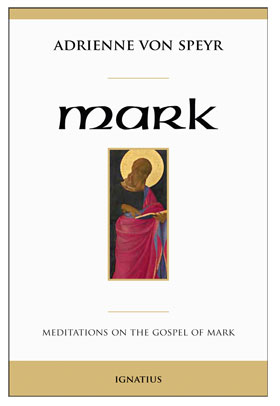Podcast: Play in new window | Download (Duration: 14:52 — 10.2MB) | Embed
Subscribe: Android | Email | RSS
A. The ever-greater God
He said to them, “Why are you afraid? Why do you still have no faith?” (Mk 4:40)
“Still no faith.” Let us contemplate this “still” on its own. The Lord is greater than we think; at every moment, he can give new proofs of his ever-greater power. No one can say, “Now I know exactly how great is the Lord’s power.” The person who said this would at the same time be proclaiming that he knew just as exactly the extent of his own powerlessness. It is also not enough to say, “I know that God is almighty.” For what is all-encompassing might? But if we know that God’s might in his service is greater than anything we can imagine as “almighty”, then we know that God is the ever-greater, and we know, too, that our faith must adapt itself to this ever-greater. Of course, no one can say, “Today I believe this much, tomorrow it will be a little more, in a year quite a bit more, and five years from now even more”, for in saying this he would be claiming to have precisely that view of the whole of his faith that no one can have. We must leave this view to the Lord. But the Lord accepts faith, Christian faith, in such a way that he allows it to grow together with an insight he gives (which has its source in his view of the whole). Insight into God and faith in him grow together, because the Lord gives himself to the believer more and more.
Let us take an example from daily life. Someone says to a child, “God is big.” Then the child will ask, “Is God bigger than my big brother or my father or my uncle?” In order to grasp God’s greatness, the child will draw on comparisons from his surroundings. The child grows and learns about other powers and authorities than those in his own family, and when his question about God’s greatness leads him again to measure God against earthly greatness, he will choose for the latter measure something significantly greater than before. It is like this with our faith and its insight. Earthly values soon no longer suffice as a point of comparison. We must contemplate God himself, in faith, and seek proofs here for the greatness of the Lord. And only when the proofs are no longer enough for us, when we can no longer draw any comparisons, do we suddenly recognize, truly and objectively, that the Lord is always greater.
Mark: Meditations on the Gospel of Mark, meditation 110
B. Nothingness and limit
There comes a moment in every man’s life when he begins to reflect on his place in the whole of the cosmos, on his future, and on the limits of what he can do. But he cannot think about his future without making his past part of the present moment. He sees what he has planned and achieved so far; he also sees everything that has not been achieved, the failed remainder, which perhaps stands before him as his own failure. He remembers days of work, days of rest, his nights, his daydreams, the great deal that he has received, and the little that he has given. He sees that it will not be easy to balance the books because so many seeds have not borne fruit. Many entries are left with question marks next to them; occasionally there is a successful item that could be marked with a round figure. And yet, it is not at all clear that this figure is really round; it is part of a series along with so many other figures that do not come out right.
And now man plans. He draws conclusions from his experiences. He wants to reach farther and different goals. But suddenly he hesitates: whatever plan he makes, he must always reckon with himself. He cannot envision any future that fully satisfies him, because he cannot count on any full performance from himself. He knows himself well enough to realize that he will always be an obstacle to himself because he does not remain faithful to his best resolutions. Wherever he turns, he encounters his limits. And yet he must go on, and he cannot do this unless he has before him a road, a destination, an image of his future—unless he undertakes something that satisfies him and that he brings about by his own power.
Once again he looks back on his past. He attempts to take a sober look at the obstacles that he himself placed on the path, to draw up an account of all that he has neglected. He tries to do this in a spirit in which he calls things by name and perceives the truth about the forces at work. None of this is easy, because as soon as he gives these failures their real name, he becomes painfully aware of his own responsibility. This failure humiliates him, and now things might seem darker to him than they really are. His confidence in the future wavers. He realizes how much remains undone; how often something was tried, abandoned, and forgotten again. The very first difficulty threw him off track; he simply gave up.
The past weighs on him and paralyzes his new resolutions. He knows beforehand that it will not work. He looks around in search of heroes who made up their minds to do some great work and did not let anything keep them from it. He would gladly be such a person, with the corresponding strength, ability, and perseverance. There is no end to his wishes and yearnings, but resignation debilitates them. He knows that, when all is said and done, he is no hero. Everything about him is futile.
- The New Meaning of Nothingness
It may occur to him that there are also Christian heroes. In their lives things really have been performed and accomplished, things whole and holy. If we examine more closely what they have done, if we try to penetrate into the mechanism of their achievement, we find aspects that can be understood together with a great deal that remains opaque. And yet the deed stands there in its rounded integrity, and it is impossible to detect any seams in it. This is curious, disturbing, and unsettling. From where does this unity come? Suddenly it becomes clear: In the Christian hero, the saint, man’s nothingness is overcome. It has been absorbed into holiness. This indivisibility is grace, and it comes from God. God takes care of his own to the point of completely enveloping and covering them with his grace. But they are not buried underneath it, and they do not lose their distinctive face; they are not paralyzed by the weight of an excessive giving. Rather grace permeates, saturates, and sets aglow their entire being and places them in a new physical condition. Grace unites itself to man’s innermost being; it produces in the saint, as it were, an incarnation that reenacts the Incarnation of the divine Son. Christ is God who became man in order to perform as God-man his integral, seamless deeds. The saint is a graced man and is permitted to perform equally integral deeds. By God’s arrangement and action, grace and man have become a single reality. The resulting work retains the properties of both—those of man and those of grace—but forever united.
Whoever considers this successful outcome understands that man’s nothingness represents a state of deficiency. Man lacks something. His sin has moved him away from the place where he should and could stand. He can, of course, fool himself into thinking that through sin he merely has strayed onto a bypath from which he still sees the right way. But deep down he knows better. He no longer sees the right way. He has become entangled in a thicket that his eye can no longer pierce in any way. Reflection alone cannot help him find the way out. He does not know how best to use his remaining strength. He needs grace for this, and therefore he must first of all submit. He must make himself so light that grace outweighs everything else in him. He must forget himself—this is the only true conclusion that follows from the recognition of his nothingness—in order to allow grace to stream into the empty space that he is.
As far as he is concerned, then, he is incapable of imitating the Christian hero. He cannot set off on his own to follow him. And nevertheless the image remains, the example with its radiant, inviting appeal. On the one side, he stands with his failure, his doubts, and with the need to make plans for his life that he knows he cannot sustain. On the other side stands the round deed of the apostolic man that shines upon him, challenges him, and fascinates him. Yet he realizes that he cannot leap over the intervening gulf by imitating from this side the deeds of a person who is on the other side. Rather he must get out of himself. The first comprehensive deed concerns the ‘‘I’’ itself. He must go out of himself; he must step outside of his own self. And this is a sort of annihilation, a forgetting and a losing of himself, and a call for a new solitude. It is a bursting of his own center in order to free up space for God, who enters into this center and from there makes something new out of him. Who above all takes him into his service. This possession must become the unifying point in him, but he will not be able to occupy, fix, or experience this point himself. He is catapulted out of the limits of this nothingness, but he cannot trace this described trajectory, because he has surrendered and lost himself.
All at once the word ‘‘nothingness’’ acquires a new meaning for him; it is now nothing more than a signal, a warning sign.
Man Before God, pp. 7-11

